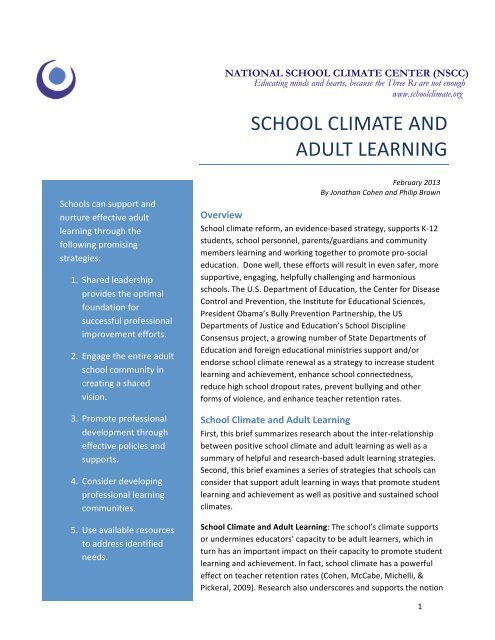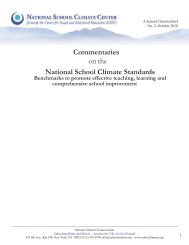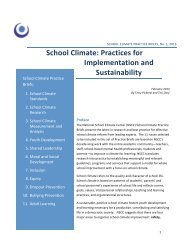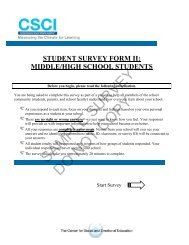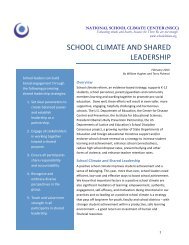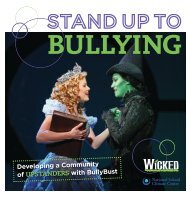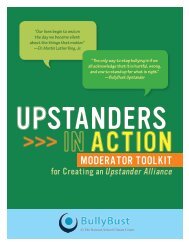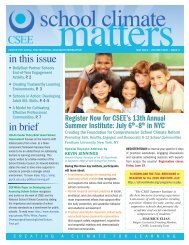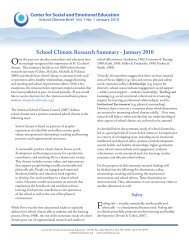SCHOOL CLIMATE AND ADULT LEARNING - National School ...
SCHOOL CLIMATE AND ADULT LEARNING - National School ...
SCHOOL CLIMATE AND ADULT LEARNING - National School ...
You also want an ePaper? Increase the reach of your titles
YUMPU automatically turns print PDFs into web optimized ePapers that Google loves.
NATIONAL <strong>SCHOOL</strong> <strong>CLIMATE</strong> CENTER (NSCC)<br />
Educating minds and hearts, because the Three Rs are not enough<br />
www.schoolclimate.org<br />
<strong>SCHOOL</strong> <strong>CLIMATE</strong> <strong>AND</strong> <br />
<strong>ADULT</strong> <strong>LEARNING</strong> <br />
<strong>School</strong>s can support and <br />
nurture effective adult <br />
learning through the <br />
following promising <br />
strategies: <br />
1. Shared leadership <br />
provides the optimal <br />
foundation for <br />
successful professional <br />
improvement efforts. <br />
2. Engage the entire adult <br />
school community in <br />
creating a shared <br />
vision. <br />
3. Promote professional <br />
development through <br />
effective policies and <br />
supports. <br />
4. Consider developing <br />
professional learning <br />
communities. <br />
5. Use available resources <br />
to address identified <br />
needs. <br />
Overview <br />
February 2013 <br />
By Jonathan Cohen and Philip Brown <br />
<strong>School</strong> climate reform, an evidence-‐based strategy, supports K-‐12 <br />
students, school personnel, parents/guardians and community <br />
members learning and working together to promote pro-‐social <br />
education. Done well, these efforts will result in even safer, more <br />
supportive, engaging, helpfully challenging and harmonious <br />
schools. The U.S. Department of Education, the Center for Disease <br />
Control and Prevention, the Institute for Educational Sciences, <br />
President Obama’s Bully Prevention Partnership, the US <br />
Departments of Justice and Education’s <strong>School</strong> Discipline <br />
Consensus project, a growing number of State Departments of <br />
Education and foreign educational ministries support and/or <br />
endorse school climate renewal as a strategy to increase student <br />
learning and achievement, enhance school connectedness, <br />
reduce high school dropout rates, prevent bullying and other <br />
forms of violence, and enhance teacher retention rates.<br />
<strong>School</strong> Climate and Adult Learning <br />
First, this brief summarizes research about the inter-‐relationship <br />
between positive school climate and adult learning as well as a <br />
summary of helpful and research-‐based adult learning strategies. <br />
Second, this brief examines a series of strategies that schools can <br />
consider that support adult learning in ways that promote student <br />
learning and achievement as well as positive and sustained school <br />
climates. <br />
<strong>School</strong> Climate and Adult Learning: The school’s climate supports <br />
or undermines educators’ capacity to be adult learners, which in <br />
turn has an important impact on their capacity to promote student <br />
learning and achievement. In fact, school climate has a powerful <br />
effect on teacher retention rates (Cohen, McCabe, Michelli, & <br />
Pickeral, 2009). Research also underscores and supports the notion <br />
1
that a collaborative school climate and collegial adult climate focused on the well-‐being and growth of all <br />
children provides an <br />
essential foundation for effective teaching and <br />
supportive learning environments (Cohen, et al. <br />
2009). <br />
The school climate improvement process – by <br />
definition – is an intentional, strategic, <br />
collaborative, transparent process of educators <br />
(and other school personnel), students, <br />
parent/guardians and even community members <br />
learning and working together to promote <br />
prosocial learning and safer, more supportive, <br />
engaging and democratically informed schools. <br />
Adult learning is an explicit and foundational <br />
component of the school climate improvement <br />
process (<strong>National</strong> <strong>School</strong> Climate Council, 2012). <br />
Adult learning provides an essential foundation <br />
for effective teaching and teacher retention. We <br />
know that successful building leaders influence <br />
student achievement through two important <br />
pathways: (i) supporting and helping to develop <br />
teachers; and, (ii) setting directions for the <br />
school through the development of shared goals <br />
(Davis, Darling-‐Hammond, LaPointe & <br />
Meyerson, 2005). To develop the competencies <br />
that educators need to promote K-‐12 students’ <br />
healthy development, capacity to learn and <br />
achieve, they must be vital, ongoing adult social, <br />
emotional and civic learners themselves. In fact, <br />
educators – and parents – are always teaching <br />
social, emotional and civic lessons through their <br />
behaviors and interactions: intentionally, <br />
consciously, systematically and helpfully -‐ or not! <br />
Professional development, school climate and <br />
adult learning: Over the last decade, research <br />
has underscored what many educators have long <br />
known: one shot or “drive by” PD workshops <br />
that are developed by building or district leaders <br />
are not helpful (Stein, Smith & Silver, 1999). <br />
Professional development (PD) research has <br />
begun to reach a consensus about the content, <br />
context and design of high quality professional <br />
development (Darling-‐Hammond & Richardson, <br />
2009; Hawley & Valii, 1999). We have learned, <br />
for example that: <br />
• Helpful PD is designed based on active <br />
participation by educators in identifying <br />
their needs and in establishing job-embedded<br />
PD plans that meet those needs <br />
through collaboration, assessment, <br />
observation and reflection rather than <br />
abstract discussions (Killion & Roy, 2009). <br />
• A healthy school climate is necessary for <br />
collaborative, job-‐embedded PD to be <br />
successful. Healthy school cultures that <br />
nurture a professional, collegial climate for <br />
teachers correlate strongly with increased <br />
student motivation and with teacher <br />
productivity and satisfaction (Deal & <br />
Peterson, 2009, Marzano, 2003). <br />
• The context of PD work also matters: PD is <br />
more effective when schools develop an <br />
intentional plan that is a coherent, ongoing <br />
part of the school's reform efforts, rather <br />
than being an isolated, one-‐shot workshop <br />
(Killion & Roy, 2009). <br />
Strategies to Guide Effective Practice <br />
1. Principal Leadership: The principal can and <br />
needs to explicitly and actively encourage <br />
educators to identify, pursue and share their <br />
own adult learning objectives. Successful <br />
professional learning communities (PLCs) will <br />
require a shift in the traditional leadership role <br />
from leader-‐centered (top-‐down) to shared <br />
leadership. Principals need to lead from the <br />
center rather than the top.<br />
Principals can and need to also understand and <br />
support fellow educators in addressing to what <br />
extent they are working, teaching and learning <br />
2
within a climate of blame and/or distrust vs. a <br />
more trusting, collaborative problem solving “no <br />
fault” framework that provides the optimal <br />
foundation for learning and school reform <br />
efforts. <br />
2. Engaging the whole community of educators <br />
and related school personnel: <strong>School</strong> leaders <br />
need to consider how to facilitate the <br />
development of a shared vision of what it means <br />
to be a vital and ongoing educator/ learner/ <br />
teacher. This process provides the foundation <br />
and ability for educators to make it an explicit <br />
and agreed upon social norm that we are all <br />
invested in being ongoing learners as well as <br />
teachers. <br />
3. Policies and supports for professional <br />
development: Districts develop policies and <br />
supports that explicitly value and promote a <br />
model of adult learning that fosters collaboration <br />
and job-‐embedded PD that is focused on student <br />
development as well as effective student <br />
instruction. <br />
• PD that focuses on student learning and <br />
supports teachers developing and <br />
experimenting with instructional skills to <br />
teach specific kinds of content has a very <br />
strong and positive impact on practice <br />
(Blank, de las Atlas, & Smith, 2007; <br />
Wenglingksy, 2000). <br />
• Adult, active learning that includes “hands-on”<br />
work such as project-‐based learning or <br />
action research focused on identified <br />
instructional issues or student needs <br />
supports meaningful and helpful PD work. <br />
• Effective PD must also consider how <br />
teachers learn: active learning <br />
opportunities allow teachers to transform <br />
their teaching and not simply add a new <br />
strategy on top of the old (Snow-‐Renner & <br />
Laure, 2005). Teaching practices and <br />
student learning are most likely to be <br />
transformed by PD that is sustained, <br />
coherent and intensive, rather than <br />
episodic, fragmented and a one-‐shot <br />
experience (Darling-‐Hammond & <br />
Richardson, 2009). In fact, PD that lasted 14 <br />
or fewer hours showed no effects on adult <br />
learning. And, the largest effects were for <br />
PD efforts that were between 30 and 100 <br />
hours spread out over six to twelve months <br />
(Yoon, Duncan, Lee, Scarloss & Shapley, <br />
2007). <br />
4. Professional Learning Communities (PLC's): <br />
With the support of building leadership, <br />
educators need to consider developing PLC’s. In <br />
PLC’s, educators learn and work together, <br />
engaging in open and honest conversations and <br />
practice that is focused on effective instructional <br />
practices. Teachers learn from each other: <br />
learning, trying out and reflecting. PLC’s need <br />
supportive leadership, mutual respect, a <br />
commitment to learning, and a climate that <br />
supports risk taking, innovation and a “no <br />
blame” climate. Building such a truly <br />
collaborative culture requires attention to the <br />
following foundational factors: <br />
• Setting, describing and modeling expected <br />
norms and practices: Establishing core <br />
ethical and performance values with <br />
associated behaviors for all members of the <br />
school community sets expectations that <br />
can reinforce positive assets and transform <br />
negative aspects of school culture (Lickona <br />
& Davidson, 2005, Brown & Sapora-‐Day, <br />
2008). <br />
• Building trust: Trust, respect, and collegial <br />
interaction among teachers and <br />
administrators can make or break school <br />
reform efforts because change efforts <br />
involve risk, and a sense of safety is <br />
necessary to look at issues clearly and <br />
experiment with new practices (Bryk & <br />
Schneider, 2002; Westbrook & Hord, 2000). <br />
• Empowering teacher leadership: <strong>School</strong> <br />
leaders need to solicit and use teachers' <br />
3
insights and input if meaningful <br />
collaboration is to happen. Creating a <br />
listening atmosphere promotes a culture of <br />
shared leadership and collective learning. <br />
Tokenism leads to loss of trust and <br />
resistance to change (Killion & Roy, 2009). <br />
Japanese Lesson Plans (Lewis, 2002; Hurd & <br />
Lewis, 2011) as well as Critical Friends <br />
Groups (Dunne, Nave, & Lewis, 2001) are <br />
two wonderful models that support this <br />
work. <br />
• Centering on student development: <br />
Focusing on the development of the whole <br />
child and remembering to ask, "Is it better <br />
for kids?" rather than being consumed by <br />
test scores, personality clashes, and <br />
comparisons with other schools sets the <br />
conditions for collaboration and learning <br />
communities which impact child well-‐being <br />
and performance (Westbrook & Hord, <br />
2000; McCloskey, 2011). <br />
5. Study groups and individual adult learning: <br />
Educators and school-‐based mental health <br />
professionals need to consider what they want <br />
and need to learn more about to support their <br />
own learning. Study group guidelines and <br />
materials, for example, in the <strong>School</strong> Climate <br />
Resource Center (http://scrc.schoolclimate.org) <br />
and/or Critical Friends groups are two examples <br />
of resources and frameworks that can powerfully <br />
support meaningful adult learning that will not <br />
only enhance educators’ ability to support <br />
student learning, prosocial education and <br />
positive school climates, but their own <br />
inclination to continue to be an engaged <br />
teacher/learner! <br />
Summary <br />
Meaningful adult learning supports educators <br />
being even more effective teachers to K-‐12 <br />
students. And, an effective school climate <br />
improvement process – by definition – supports <br />
educators considering what they want and need <br />
to learn more about to effectively educate <br />
students and support safe, supportive, engaging <br />
and flourishing classrooms and schools. In this <br />
brief, we have summarized research about the <br />
inter-‐relationship between positive school <br />
climate and adult learning as well as a summary <br />
of helpful and research-‐based adult learning <br />
strategies. This research informed the series of <br />
strategies that classrooms and schools can <br />
consider that support adult learning in ways that <br />
promote student learning and achievement as <br />
well as positive and sustained school climates. <br />
References <br />
Blank, R. K., de las Alas, N. & Smith, C. (2007). Analysis of <br />
the quality of professional development programs for <br />
mathematics and science teachers. Washington, DC: Council <br />
of Chief State <strong>School</strong> Officers. <br />
Brown, P.M. & Sapora-‐Day, R. (2008). Professional learning <br />
communities: Building a school culture that supports <br />
learning for all. Piscataway, NJ: Rutgers University Center <br />
for Applied Psychology. Available online at: <br />
http://cscd.rutgers.edu/file/0000072470-‐<br />
FCSCCE_Report_FINAL_VERSION.pdf. <br />
Bryk, A. S., & Schneider, B. L. (2002). Trust in schools: A core <br />
resource for improvement. New York: Sage. <br />
Darling-‐Hammond, L. & Richardson, N. (2009). Teacher <br />
learning: What matters? Educational Leadership, pg. 46-‐53. <br />
Cohen, J,. McCabe, E.M, Michelli, N.M & Pickeral, T. <br />
(2009). <strong>School</strong> Climate: Research, Policy, Teacher Education <br />
and Practice. Teachers College Record, Volume 111: Issue 1: <br />
pp. 180-‐213. Available online at: <br />
www.tcrecord.org/Content.asp?ContentId=15220. <br />
Davis, S.; Darling-‐Hammond, L.; LaPointe, M.; & Meyerson, <br />
D. (2005). <strong>School</strong> leadership study: Developing successful <br />
principals (Review of Research). Stanford, CA: Stanford <br />
University, Stanford Educational Leadership Institute. <br />
Deal, T. & Peterson, K. (2009). Shaping school culture: <br />
Pitfalls, paradoxes and promises. San Francisco: Jossey <br />
Bass. <br />
Dunne, F, Nave, B., & Lewis. A. (2001). Critical friends: <br />
Teachers helping to improve student learning. Phi Delta <br />
Kappa International Research Bulletin, 28. 9-‐12. <br />
Hawley, W D., & Valli. L. (1999). The essentials of effective <br />
professional development: A new consensus. In L. Darling-‐ <br />
Hammond &r G. Sykes (Eds.), Teaching as the learning <br />
profession: Handbook for policy and practice (pp. 127-‐150). <br />
San Francisco: Jossey-‐Bass. <br />
4
Hurd, J. & Lewis, C. (2011). Lesson Study Step by Step: How <br />
teacher learning communities improve instruction. <br />
Porstmouth, NH: Heinemann. <br />
Lewis, C. (2002). Lesson Study: A Handbook of Teacher-‐led <br />
instructional change. Research for Better <strong>School</strong>s. <br />
Lickona, T. and M. Davidson (2005). Smart & good high <br />
schools: Integrating excellence and ethics for success in <br />
school, work and beyond. Cortland, NY & Washington, DC: <br />
Center for the 4th & 5th Rs and Character Education <br />
Partnership. <br />
Marzano, R. (2003). What works in schools: Translating <br />
research into action. Alexandria, VA: ASCD. <br />
McCloskey, M. The common core of a whole child approach: <br />
Webinar November 22, 2011. ASCD. Available online at: <br />
www.ascd.org/professional-‐development/webinars/molly-mccloskey-‐webinar.aspx.<br />
<br />
Wenglinsky. H. (2000). Hew teaching matters: Bringing the <br />
classroom back into discussions of teacher quality. <br />
Princeton. NY: Milken. <br />
Authors: <br />
Jonathan Cohen, Co-‐founder and President <br />
<strong>National</strong> <strong>School</strong> Climate Center (NSCC) and <br />
Adjunct Professor in Psychology and Education, <br />
Teachers College, Columbia University <br />
<strong>National</strong> <strong>School</strong> Climate Center <br />
http://www.schoolclimate.org <br />
Philip Brown, Senior Consultant <br />
<strong>National</strong> <strong>School</strong> Climate Center <br />
http://www.schoolclimate.org <br />
<strong>National</strong> <strong>School</strong> Climate Council (2012). The <strong>School</strong> Climate <br />
Improvement Process: Essential Elements. <strong>School</strong> Climate <br />
Brief, No. 4. Available online at: <br />
http://www.schoolclimate.org/climate/schoolclimatebriefs.<br />
php. <br />
Stein, M. K , Smith. M S., & Silver, E. A. {1999), The <br />
development of professional developers: Learning to assist <br />
teachers in new settings in new ways. Harvard Educational <br />
Review. 69(3), 237-‐269. <br />
Suggested citation: Cohen, J. & Brown, P. (2013). <strong>School</strong> climate and adult learning. In Dary, T. & Pickeral, <br />
T. (ed) (2013). <strong>School</strong> Climate: Practices for Implementation and Sustainability. A <strong>School</strong> Climate Practice <br />
Brief, Number 1, New York, NY: <strong>National</strong> <strong>School</strong> Climate Center. <br />
2013 © <strong>National</strong> <strong>School</strong> Climate Center, NYC<br />
Photocopying for nonprofit educational purposes is permitted.<br />
____________________________________________________________________________________<br />
This <strong>School</strong> Climate Practice Brief is one of 11 briefs presenting the latest in research and best practice<br />
for effective school climate reform from leading experts. All <strong>School</strong> Climate Practice Briefs can be found<br />
at: http://www.schoolclimate.org/publications/practice-briefs.php<br />
5


